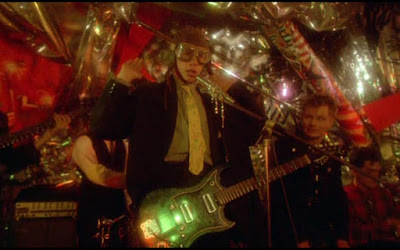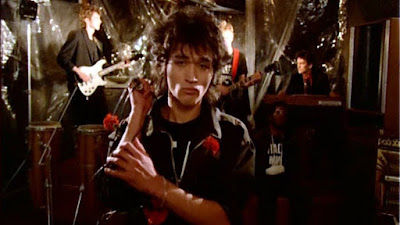Can a film become a countercultural anthem that signifies major
sociopolitical changes in a then-metamorphosizing country on the brink of
transformative collapse? Well back in
1987, Soviet-Russian writer-director Sergei Solovyov and co-writer Sergei
Livnev’s searing yet highly experimental Crimean set rock-crime “Chernukha” Assa
or ACCA brought about such changes with the emergence of the Soviet
underground rock scene and the Perestroika film into mainstream popular
consciousness. Known as the only other
film featuring legendary Russian rock performer Viktor Tsoi onscreen, Solovyov’s
Assa soon evolved into a symbol of protest whose heavy emotional powers
can still be felt by film and music lovers today.
Opening on an underground Russian rock concert with people
dancing in Yalta, we meet curious and open minded Bananan (Sergei “Afrika”
Bugaev) who functions as one of the drummers.
There his path crosses with Alika (Tatyana Drubich), a very young nurse
who has formed a romantic relationship with her middle-aged patient Krymov
(Stanislav Govorukhin), a intellectual bookworm who in actuality runs a
criminal group overseen by dim KGB agents.
Unbeknownst to Krymov, Alika and Bananan quickly form a tight friendship
that borders on romance as he introduces her to Soviet counterculture including
but not limited to showing off his musical hero Nick Cave.
If Bananan
represents the ordinary young Russian citizen being trampled upon by the rules
of the old Russia represented by Krymov, then Viktor Tsoi playing himself in
the film’s most famous and unforgettable scene is the logical culmination of
those two extremes seen in microcosm. So
ferocious, intensely physical and charismatic is Tsoi’s performance in this
movie, performed only at the age of twenty-four, it imprints itself into your repertoire
almost immediately irrespective of your background or political leanings.
Filmed over two months followed by another eight just to get
it approved, Assa was initially misunderstood by the first viewers who
dealt with it…then it became a countercultural symbol many credit with being
contributory to the dissolution of the Soviet Union. For writer-director Sergei Solovyov, the film
became the first installment of a trilogy of like-minded films tackling
similarly controversial but important fare such as Black Rose – The Emblem
of Sorrow, Red Rose – The Emblem of Love and House Under the Starry Sky.
For the underground Russian rock music scene
where Kino initially recorded most of their albums illegally, to have it catapulted
right into the face of mainstream moviegoers was kind of shocking if not really
very cool for its time and place. To a
western filmgoer still wading through the countless iterations of eastern European
art, Assa is a metallic baseball spiked home run that might make you
bleed a little but will leave you feeling refreshed if not deeply moved. Simply put, one of the greatest Soviet films
to emerge as the Union itself started to see itself ending.
--Andrew Kotwicki





